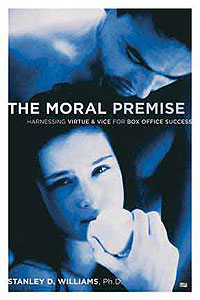
"The most powerful tool in my new tool box."
Will Smith
"A total game changer. The Moral Premise gets your story (and all your characters) working for you, instead of the other way around."
Michael Jann, Sr. Writer, Tonight Show with Jay Leno
"The Moral Premise dares to suggest that movies might actually mean something."
Chris Vogler, "The Writer's Journey"
"Thanks for the great book. I will recommend it to all my classes."
Blake Snyder, WGA, Author "Save the Cat"
"An incredibly practical and helpful tool that should be taught in every film school."
Marianne & Cormac Wibberley, WGA (National Treasure and National Treasure: Book of Secrets)
"Stan, You are a light and an incredible gift! Thank you for your insight and innovation.The Moral Premise: It's Amazing!"
DeVon Franklin, VP, Sony Entertainment
Author, "Produced by Faith."
"Should be required reading, retroactively, for every working Hollywood screenwriter."
Brian Bird, WGA, Producer
"Thank you, thank you, thank you for your wonderful Moral Premise, and for all you've done for me and my writing, Stan."
Tamera Alexander, Novelist
"This is really an important book."
Derek Rydall "The Script Doctor"
"Drop all of your 'to-do' lists, get this book, and curl up for the read of your screenwriting lifetime."
Dave Anderson, President, Compass Film Academy
Aspiring or working screenwriters - I have a tip for you. Buy the THE MORAL PREMISE by Stanley D. Williams and read it twice.
Paul Lalonde, Chairman, Cloud Ten Pictures
"More than a must-read; it is groundbreaking."
Curt LaLonde
More Endorsements >>
|
OVERVIEW
This site is designed to help writers of any story genre connect with mainstream audiences by providing resources and information about how a true moral premise can be consistently applied to every aspect of story creation. We focus on motion pictures, but the techniques and information apply to plays, novels, short stories, oral storytelling, and news. The concept is explained in the book described below. It's expanded and expounded upon at the various other pages available and being planned at this site. Check back for new additions. Suggestions? Write Stan(at)MoralPremise.com.
The Moral Premise Book Overview
ISBN 1-932907-13-0 - 199 pages, 10 pictures, Research Appendix, Films Cited, Text Cited, Topical Index, Moral Premise Index, 16 Tables, 6 Figures, 105 footnotes. Michael Wiese Productions (publisher). Ingram (Distributor).
The Moral Premise: Harnessing Virtue and Vice for Box Office Success reveals the foundational concept at the heart of all successful box office movies and other stories. It is a principle that has been passed down from ancient times. It is a principle that modern research has shown is in all great stories that connect with audiences. If you ignore this principle, your story is doomed. But if you consistently apply it to each character, scene, and dramatic beat, it is the principle that will empower your storytelling, and illuminate all the other techniques you bring to the craft. It is the guiding principle of writing that allows films and all stories to be great.
In brief, the Moral Premise describes how successful motion pictures are always structured around a psychological (or spiritual) premise based on true moral values, and how screenwriters can appropriate the structural elements of the moral premise to write successful movies.
This concept has been at the heart of all successful story telling from ancient times. We find its controlling nature in the writings of Plato, the Bible, and Aesop. We find it in English Classics from Henry Fielding on...and in the many good stories of modern stage, movies, and television. Most respected writers on screenplays mention it, but they use a variety of confusing terms and never tell us how important it is...except Lajos Egri in his "The Art of Dramatic Writing." But Egri's book is about stage plays and doesn't lay out for us, in practical terms, how to apply the moral premise to creation of a new work. In The Moral Premise I not only concentrate on motion pictures that dominate the American box office, but I provide a practical step-by-step approach to incorporating the moral premise and setting up a screenplays' structure for success.
While the physical, explicit story or plot line is what a movie is about, the psychological or moral premise is what the movie is "really" about. And the sooner a screenwriter and filmmaker understand its importance, and how it needs to be incorporated into every nook and cranny of a story, the faster the screenplay will get written, and the more successful the final film will be at the box office.
Although every successful screenwriter and filmmaker pays homage to the moral premise by ensuring the story is structured consistently and truthfully around it, there is no book that I am aware of that explains where the moral premise comes from, how it works, or how to apply it in new screenplays and films. Until now.
|




